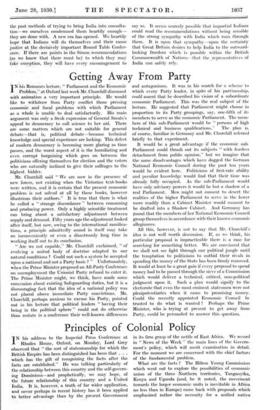Getting Away From Party
TN his Romanes lecture, "Parliament and the Economic Prublem," at Oxford last week Mr. Churchill discussed with animation a very important principle. He would like to withdraw from Party conflict those pressing economic and fiscal problems with which Parliament as a whole is unable to deal satisfactorily. His main argument ivas only a fresh expression of General Smuts's appeal to democracy to call science to her aid. There are some matters which are not suitable for general debate—that is, political debate—because technical knowledge and special experience are lacking. This defect a modern democracy is becoming more glaring as time passes, and the worst aspect of it is the humiliating and even corrupt bargaining which goes on• between the politicians offering themselves for election and the voters who are naturally inclined to give their suffrages to the highest bidder.
. Mr. Churchill said "We are now in the presence of new forces, not existing when the Victorian text-books were written, and it is certain that the present economic problem is not solved at all by those books, however illustrious their authors." It is true that there is what he called a "strange discordance" between consuming and producing power. Only a highly scientific treatment can bring about a satisfactory adjustment between supply and demand. Fifty years ago the adjustment looked after itself, but now, owing to the international ramifica- tions, a principle admittedly sound in itself may take an inconveniently- or even a disastrously long time in working itself out to its conclusion.
"Are we not capable," Mr. Churchill exclaimed, "of evolving a united body of doctrine adapted to our natural conditions ? Could not such a system be accepted Upou a national and not a Party basis ? " Unfortunately, when the Prime Minister proposed an All-Party Conference on. unemployment the Unionist Party refused to enter it. The Prime Minister might, we think, have made some concession about existing Safeguarding duties, but it is a discouraging fact that the idea of a national policy was not - placed above immediate Party convictions. .Mr. Churchill, perhaps anxious to excuse his Party, pointed out in his lecture that political leaders "having their being in the political sphere" could not do otherwise than restate in a conference their well-known differences and antagonisms. It was in his search for a scheme to which every Party leader, in spite of his partisanship, could assent that he described his vision of a subordinate economic Parliament. This was the real subject of the lecture. He suggested that Parliament might choose in proportion to its Party groupings, say, one-fifth of. its members to serve as the economic Parliament. The mem- bers of this sub-Parliament would be "persons of high technical and business qualifications." The plan is, of course, familiar in Germany and Mr. Churchill referred briefly to that experiment.
It would be a great advantage if the economic sub. Parliament could thrash out its subjects "with fearless detachment from public opinion," but we imagine that the same disadvantages which have dogged the German National Economic Council during the past ten years would be evident here. Politicians of first-rate ability and peculiar knowledge would find that their time was already fully occupied. As the sub-Parliament would have only advisory powers it would be but a shadow of a real Parliament. Men might not consent to desert the realities of the higher Parliament to serve in the lower more readily than a Cabinet Minister would consent to be drafted into a Shadow Cabinet. And Germany has found that the members of her National Economic Council group themselves in accordance with their known economic allegiances.
All this, however, is not to say that Mr. Churchill's idea is not well worth discussion. If, as we think, his particular proposal is impracticable there is a case for searching for something better. We are convinced that we shall not see light through our political jungle until the temptation to politicians to outbid their rivals in spending the money of the State has been firmly removed. It would at least be a great gain if every proposal to spend money had to be passed through the sieve of a Commission which would deliver a technical, critical, non-political judgment upon it. Such a plan would signify to the electorate that even the most eminent statesmen were not plenipotentiaries when it came to promising money. Could the recently appointed Economic Council be trusted to do what is wanted ? Perhaps the Prime Minister, who is trying at present to get away from Party, could be persuaded to answer this question.


















































 Previous page
Previous page